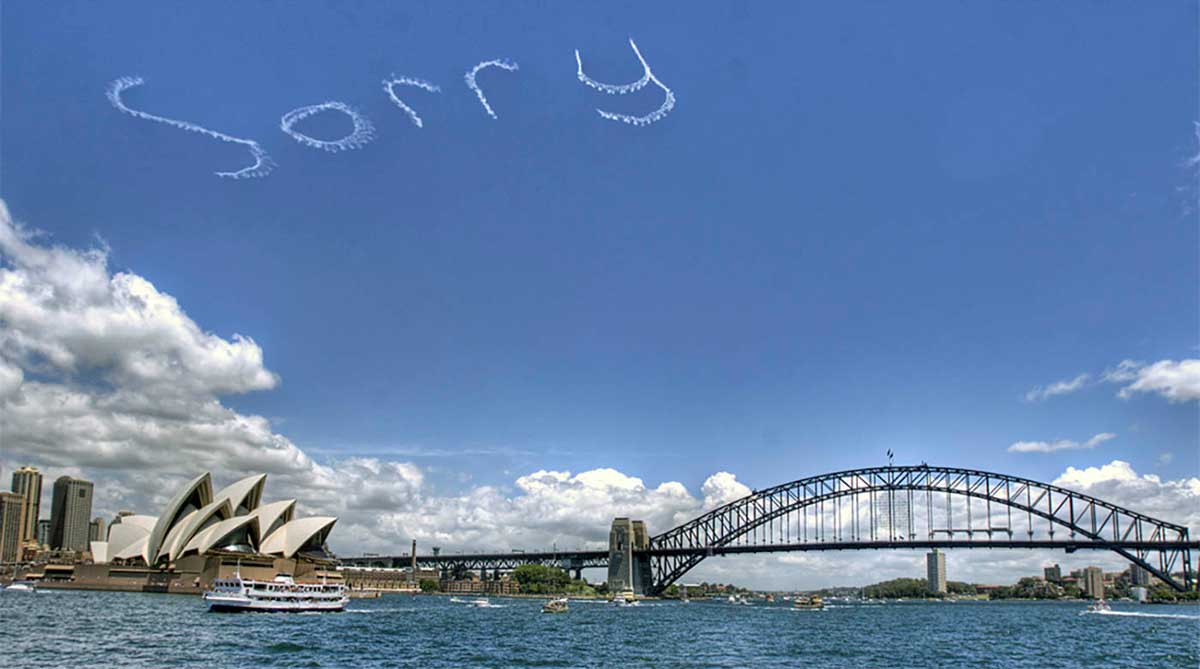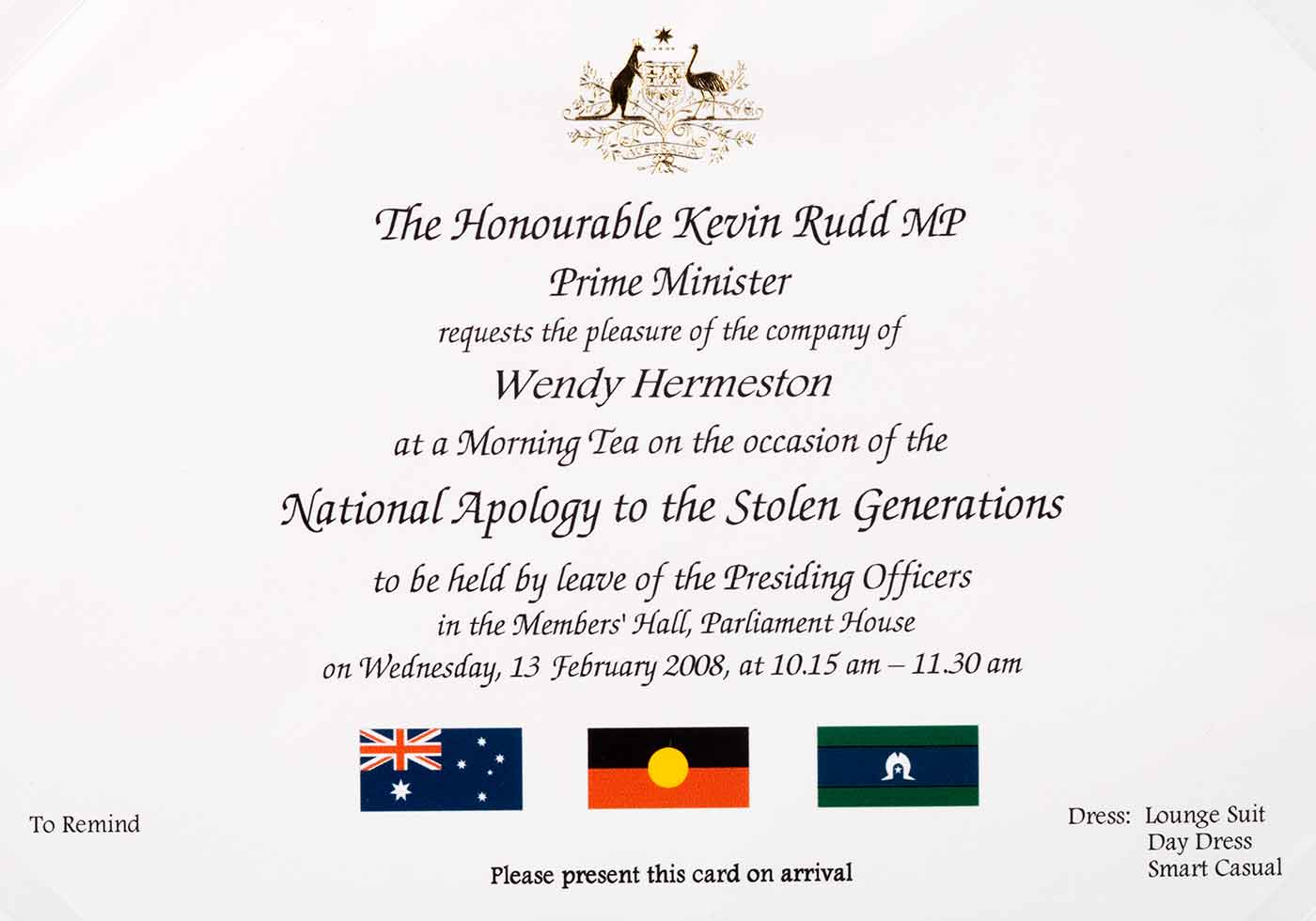On 13 February 2008 Prime Minister Kevin Rudd made a formal apology to Aboriginal and Torres Strait Islander peoples, particularly to the Stolen Generations whose lives had been blighted by past government policies of forced child removal and assimilation.
The journey to National Apology began with the Bringing Them Home report – the findings of an inquiry instigated by the Human Rights and Equal Opportunity Commission in 1995.
Prime Minister Kevin Rudd, 13 February 2008:
We apologise for the laws and policies of successive Parliaments and governments that have inflicted profound grief, suffering and loss on these our fellow Australians. We apologise especially for the removal of Aboriginal and Torres Strait Islander children from their families, their communities and their country.
Formal Apology
This moment had its origins in the Bringing Them Home report. This report tabled the findings and recommendations of the Human Rights and Equal Opportunity Commission inquiry.
The inquiry was instigated by Attorney General Michael Lavarch in May 1995, and its terms of reference were extensive. The first was a call for a thorough examination of past laws, practices and policies. It read:
- trace the past laws, practices and policies which resulted in the separation of Aboriginal and Torres Strait Islander children from their families by compulsion, duress or undue influence, and the effects of those laws, practices and policies;
Submissions to the Inquiry
The inquiry took evidence personally from 535 First Nations peoples and received hundreds of letters and testimonies from other people.
It also recognised that there were many who could have provided evidence but did not do so because they were unable to travel, uncomfortable with the public nature of the inquiry, or still too frightened or traumatised to speak of their experiences.
This last difficulty was perhaps most strongly felt by parents who had lost children and who experienced lifelong grief as well as shame for not being able to protect and keep them.
Rose, whose siblings were taken away in 1958 when she was nine, recounted how the trauma of loss destroyed her parents’ marriage. She had tried to reunite her family after she herself married:
After about 14 years my [eldest] brother came to live with us. One sister found us through the Salvation Army about 16 years later. Then my [baby] brother … who died last year … was caught up in the system, was like a lost street kid and was bashed by the police in Melbourne a couple of years ago. [He] ended up with a tumour on the brain and was never the same again. My second sister … my family didn't see for 27 years. What could anyone do now to make up for those 27 years of not having their sister a part of their life? [It’s] a terrible big hole in my heart that will never be filled.
We all are in contact with each other now and we try to make up for all those lost years. But something’s missing.
Paul’s mother was tricked into putting him into a home while she recovered from a serious illness. Paul was made a ward of the state, and his mother’s consent for adoption was not sought. His adoptive family rejected him after seven months and Paul was placed in an orphanage. He was then placed with an abusive foster family.
In his submission to the inquiry, Paul noted:
My Mother never gave up trying to locate me. She wrote many letters to the State Welfare Authorities, pleading with them to give her son back. Birthday and Christmas cards were sent care of the Welfare Department. All these letters were shelved. The State Welfare Department treated my Mother like dirt, and with utter contempt, as if she never existed.
Based upon multiple stories such as these, the report made 54 recommendations. Recommendations five and six indicated that all governments, police forces, churches and non-government agencies should issue an apology.
First apologies
The Western Australian Government was the first state government to act, issuing its apology on 27 May 1997. By 2001 all state and territory governments had issued apologies. Only the Australian Government, under John Howard, demurred.
First Nations peoples and their supporters began a campaign to spread awareness and build support in the broader Australian community for a federal apology.
The National Sorry Day Committee organised many different events over the years including another of the National Museum’s Defining Moments, the 2000 Walk for Reconciliation across the Sydney Harbour Bridge.
In 2007 the Labor Party under Kevin Rudd won the federal election and took office. It supported making a formal public apology to the victims of forced child removal, especially the Stolen Generations.
The Apology was the first item of business when parliament opened in 2008, and was witnessed by the thousands of people gathered in Canberra for the event and was broadcast all over the country.
The Apology elicited a wide range of emotions amongst those affected. While few believed that it would completely erase the pain of the past, many felt that a vital first step in the healing process had begun.
Dr Tom Calma, then Aboriginal and Torres Strait Islander Social Justice Commissioner, in his formal response to the Apology stated:
Through one direct act, the parliament has acknowledged the existence and the impacts of past policies and practices of forcibly removing Indigenous children from their families, and by doing so has paid respect to the Stolen Generations for their suffering and their loss, and for their resilience, and ultimately, for their dignity.
In our collection
References
Prime Minister Kevin Rudd, Apology to Australia’s Indigenous Peoples (PDF 48.4 kb), Commonwealth of Australia, Parliamentary Debates, House of Representatives, 13 February 2008.
National Inquiry into the Separation of Aboriginal and Torres Strait Islander Children From their Families (Australia) Bringing Them Home report, Australian Human Rights Commission, 1 April 1997.
Mary Terszak's story of surviving assimilation, National Museum of Australia, 2009.
Peter Read, The Stolen Generations: The Removal of Aboriginal Children in New South Wales 1883 to 1969, NSW Department of Aboriginal Affairs, Sydney, 1996.
Peter Read, Tripping over Feathers: Scenes in the Life of Joy Janaka Wiradjuri Williams: A Narrative of the Stolen Generations, University of Western Australia Press, Crawley, 2009.

